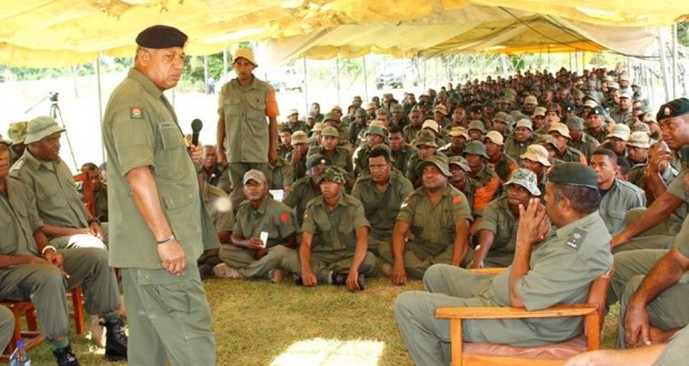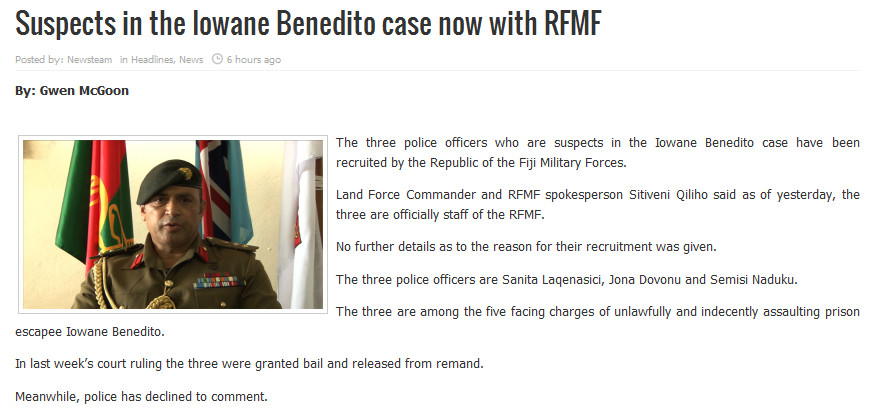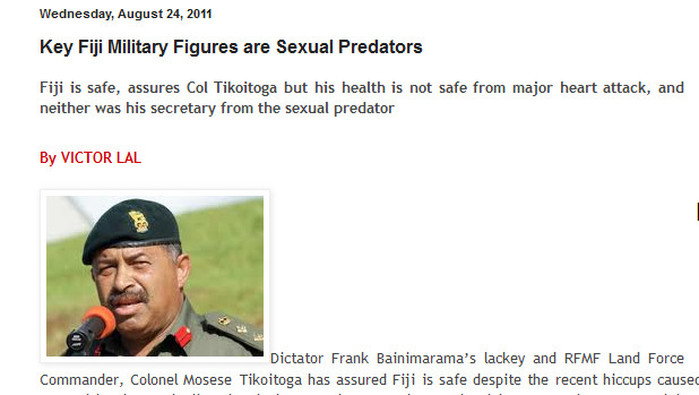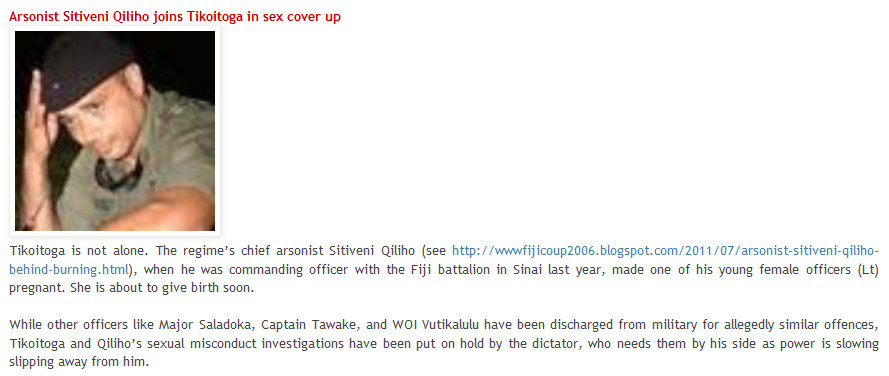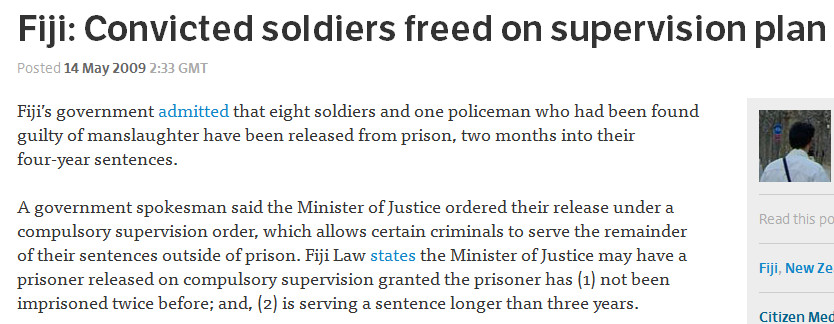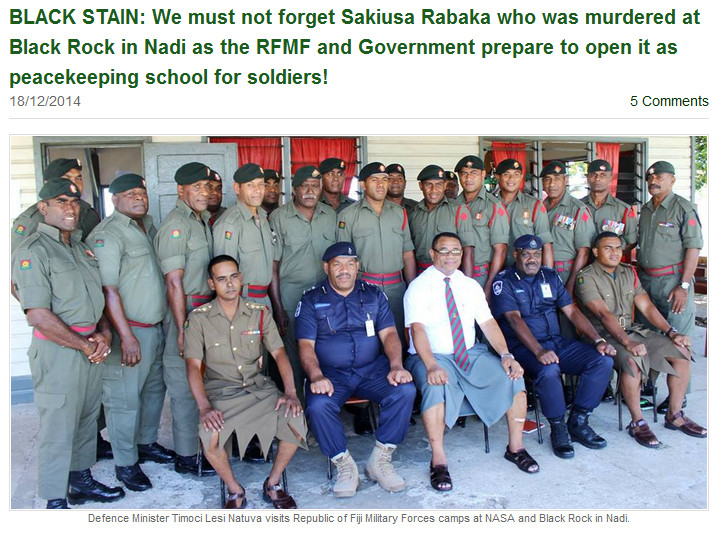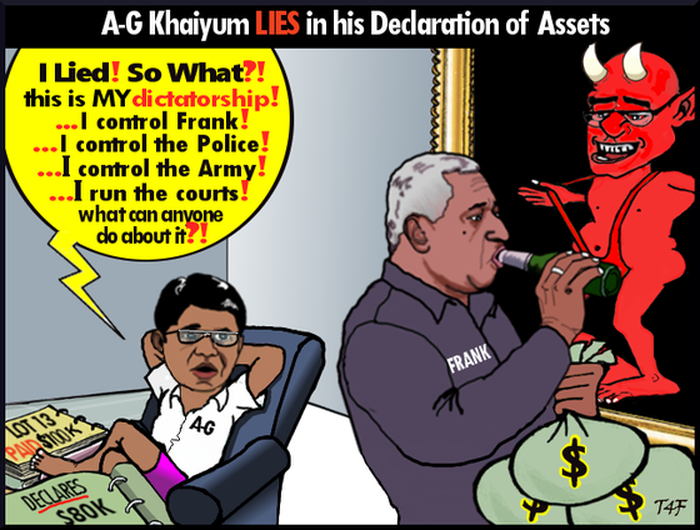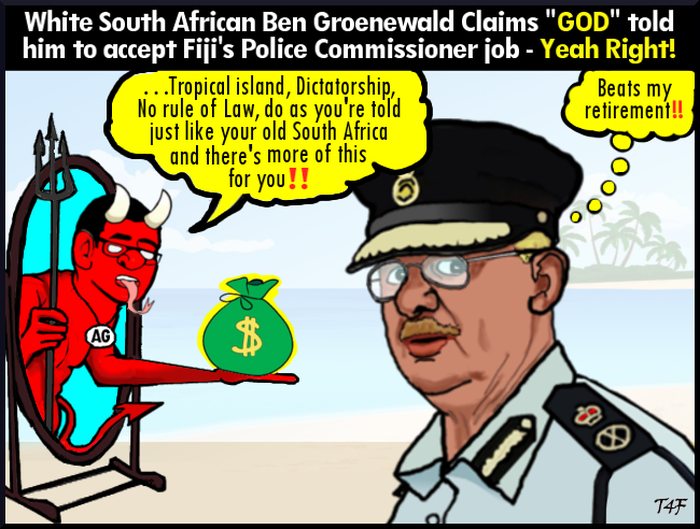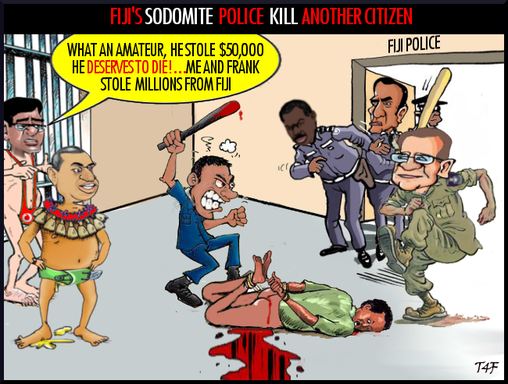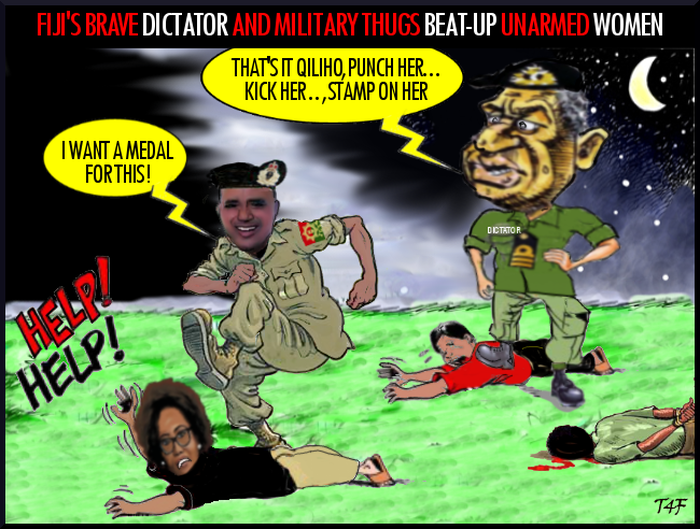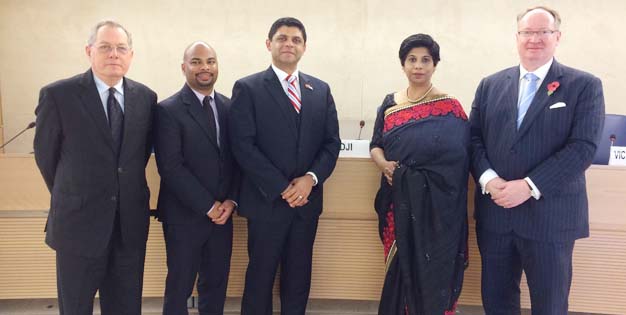Qiliho says they have recruited the three police officers as they felt that they have been left on their own
Fijileaks: THIS B******D Bully Sitiveni Qiliho in RFMF has been threatening VICTOR LAL since 2006, not to mention he threatened to KILL deposed Prime Minister Laisenia Qarase, former Fiji Sun publisher and editor-in-chief Russell Hunter, slapped and spat at Professor Brij Lal, burnt the Deuba Villa of former Fiji Court of Appeal president Justice Gordon Ward
THE RFMF has a history of protecting men of violence and terror in their ranks; from Fiji Coup 2006 website archive:
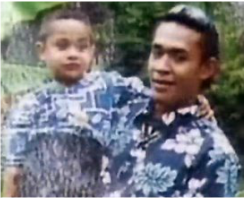
UN Played Key Role in Blocking RFMF from Deploying Nadi Teenager Sakiusa Rabaka’s murderers to Iraq
BY VICTOR LAL
Military spokesman Mosese Tikoitoga had feigned ignorance of murder charges against soldiers and policeman at Black Rock
The UN could play a part investigating human rights abuses in Fiji according to UN Secretary General, Ban Ki-Moon, human rights campaigners heard during the recent Pacific Islands Forum meeting in Auckland, New Zealand.
In fact, the UN had come down hard in 2007 when the murderous Fiji military and then Police Commissioner Esala Teleni had tried to secretly ship out for a United Nations assignment to Iraq eight soldiers and one policeman who were accused of sexual abuse, torture and cold blooded murder of 19-year-old Nadi teenager Sakiusa Rabaka.
The Nadi teenager had died in February 2007, a month after he and a group of friends were assaulted at the Black Rock military training base in Votualevu, Nadi. He was hospitalised and underwent surgery for brain injuries in the days prior to his death.
The soldiers Joeli Lesavua, Jona Nareki, Taione Lua, Napolioni Naulia, Ulaiasi Radike, Etonia Nadura, Ratunaisa Toutou, Ilaisa Kuruimavua and lone policeman Patrick Nayacalagilagi were jointly charged with one count of murder and four counts of assault occasioning actual bodily harm. They were, however, found guilty of a lesser charge of manslaughter, jailed for four years by regime’s lackey judge Justice Daniel Goundar. However, the killers were released within weeks on compulsory supervision order, prompting the DPP’s office to say that it was unusual for convicted criminals to be released so quickly after being sentenced for major crimes.
Bainimarama and Tikoitoga’s response to murder suspects Iraq tour
When Fiji media broke the story about the murder suspects being prevented from leaving for Iraq on Saturday 27 October 2007 the dictator, who has avoided a murder inquiry into his own conduct following the 2000 mutiny and deaths at Nabua camp, appeared on Fiji TV on 29 October. He denied any interference in the Rabaka murder case, claiming that he was helpless to stop any soldiers from going overseas on peacekeeping duties just because they were suspects in a murder case.
His side-kick and military spokesman Lt Col Mosese Tikoitoga said the Director of Public Prosecutions had not furnished them with a list of suspects. The Fiji Peacekeepers Association expressed concern that the soldiers implicated in the murder were not isolated from other soldiers. And Alinieta Rabaka, the mother of the late Rabaka told the press that she believed that the army had tried to send the suspects abroad to thwart the course of justice. Police, on the other hand, claimed that they were trying to establish why policeman and murder suspect Nayacalagilagi was booked on the Iraq flight.
Flight to Freedom Thwarted at Nadi Airport
On Tuesday 30 October the DPP’s Office disclosed that murder and assault charges had been laid against the nine accused on Thursday 25 October and it was forced to obtain a court order to bar the nine from leaving for peacekeeping duties in Iraq. The DPP said it had to intervene after attempts to talk to the military about Rabaka’s death had broken down. The charges were filed in the Magistrate's Court in Nadi on Thursday and the next day court summons were served on all. The DPP's Office said if the suspects had been allowed to leave on the UN-chartered flight on Saturday night it would have deferred the case for an indefinite period. In other words, the killers would have escaped justice.
The DPP issued a stop order to the Immigration Department at the Nadi International airport on Saturday. Immigration Director and military strongman Viliame Naupoto said the soldiers were taken off the flight by the army at the airport. He said the officers names could not have been on the Immigration “Watch List” if the officers made it through immigration. Tikoitoga refused to comment further, referring the press to speak to military arsonist and human rights abuser Lt Col Sitiveni Qiliho, who Tikoitoga said was responsible for the matter as he was in Nadi.
The Great Lie and Cover Up
But the Wikileaks cables from the US Embassy in Suva tell a very different story, exposing the lies and cover up of the murderous Fiji regime which was planning to send the Rabaka murderers to Iraq after the US led coalition had toppled Bainimarama’s dictator cousin Saddam Hussein, later executed for his crimes against the Iraqi people.
In one of a series of cables Larry Dinger, the then US ambassador to Fiji wrote to Washington on 25 October 2007, the day DPP had laid the charges. Under the heading “RFMF deploying murder suspects to Iraq”, Dinger wrote: “We have received information that o/a Oct. 27 the Republic of Fiji Military Forces (RFMF) will deploy to UNAMI in Iraq ten soldiers who allegedly participated in the beating deaths of two civilians early this year, the only confirmed killings related to the military “clean up” campaign after last December's coup. Ever since the beatings, the RFMF, the Fiji Police, and the Public Prosecutor Office have supposedly been investigating who did what, and consulting on what charges might be laid in what venue. It has appeared pretty obvious that the culprits were identified very early on. The endless to-ing and fro-ing since has brought repeated pleas from the families of the victims, the media, and human-rights activists for appropriate criminal trials and convictions.”
As usual, Dinger gave a background under the heading “The beating deaths: what happened”: “The military reportedly picked up Sakiusa Rabaka in the Nadi area on marijuana-related suspicions in early February. He returned home the following morning badly beaten, described his ordeal, and complained of a severe headache. Subsequent medical efforts to save his life failed. He died on Feb. 24.”
And contrary to the liar Tikoitoga that the Director of Public Prosecutions had not furnished them with a list of suspects, the US Embassy had the names of the murderers for a week, as Dinger disclosed to Washington under the heading “The alleged culprits”: “This week we obtained the names of the one RFMF suspect in the death of...9 RFMF suspects in the beating of Rabaka: Taione Lua (NCO); Patrick Nayacalagilagi (Private); Ulaiasi Radika (Private); Etonia Nadura (Private); Ratunaisa Toutou (Private); Joeli Lesavua (Private); Jona Nareki (Private); Ilaisa Kurimavua (Private); and Napolioni Naulia (Private). All ten reportedly are to depart for Iraq Oct. 27, and we are told the RFMF moved up the departure date, which was initially scheduled for a few weeks from now.”
Dinger commented in the cable: “...Rabaka's first-hand account before his death made RFMF involvement clear in his case. One Fiji Police officer was implicated, too. Commodore Bainimarama has stated publicly that the RFMF and the interim government (IG) would not obstruct justice in the cases; however, the military's actions have certainly impeded the process. There have been rumors for months that the RFMF had sent some or all of the perpetrators off to peacekeeping duties in MFO Sinai or Iraq to hinder investigations. The planned deployment of the ten soldiers this weekend, if it takes place, would clarify rumor into reality.”
Leahy Amendment sanctions and RFMF murderers
Dinger asked for guidance: “Since the deployments are to UNAMI (United Nations Assistance Mission for Iraq), we flag the matter to USUN for possible referral to UNPKO. We are also including the ten names on Embassy Suva's list for Leahy Amendment sanctions. Please advise if further Embassy Suva action is advisable.”
UN Key Role in stopping murderers’ flight to Iraq
On 29 October, the night the dictator appeared on Fiji TV and claimed that he was helpless to stop soldiers from going overseas on peacekeeping duties, Dinger told Washington under the headline, “UN letter halts RFMF plan to deploy murder suspects”:
“According to a well-placed embassy source in Fiji. Immigration, a UN intervention is what kept the Republic of Fiji Military Forces (RFMF) headquarters from deploying 7 soldiers and one policeman, all charged with murder (see reftels), to UNAMI last Saturday. Reportedly a letter from the UN reached the RFMF leadership on Saturday p.m. stating that the 8 personnel were unacceptable to the UN. All 8 had been processed through Immigration and their baggage was on board the aircraft when the RFMF “move-con” officer pulled them back. A source noted to us that RFMF plans to send the 8 had moved ahead, despite a court summons (ref A) that was intended to halt the deployment. Then the UN letter arrived and brought activity to a halt. Departure of the aircraft was delayed by two hours as events unfolded. Earlier information indicated a total of 9 personnel were deploying. It is not yet clear what happened with the 9th, Private Etonia Nadura.”
Continued Dinger: “We have heard from the UNDP ResRep in Suva that he provided UNDPA a heads-up last week, “based on the rumblings in Fiji,” that allowed rapid consultations once the issue hit the media. The ResRep said he has since been out of the loop, as DPKO and UNDSS took over, apparently conversing with the Fiji mission in New York.”
Teleni complicit in badly behaved Patrick Nayacalagilagi flight plan
Under another heading “Senior Police complicity”, Dinger informed Washington: “An interesting aspect is that the one policeman implicated in the murder case was to be included in the deployment. Reportedly, when Commodore Teleni moved from RFMF Deputy Commander to Police Commissioner last summer, he made arrangements for police to join RFMF PKO deployments, particularly to MFO Sinai. The particular policeman, Patrick Nayacalagilagi, reportedly had a bad disciplinary record, even before being charged with murder. Given the history, his inclusion in the deployment had to have been approved at a very senior level, presumably by Teleni personally.”
RFMF says “not fair;” Teleni seeks praise
Dinger continued: “The RFMF spokesman, Lt Col. Tikoitoga, defended the decision to send the personnel on a PKO assignment abroad, proposing that the Office of the Director of Public Prosecutions (ODPP) had given no indication the men would be charged. Tikoitoga said, “It is not fair” to bar departure at the final hour. Police Commissioner Teleni indicated to the media that the Police had “acted in the name of justice” by refusing to allow suspects in the murder case to depart on PKO duties. Teleni said he knew nothing of the one policeman alleged to be deploying.”
Three Murderers also Rugby Sevens Ambassadors
But Dinger remained unconvinced, commenting: “Our knowledgeable sources are amazed by the gall of Tikoitoga to claim the RFMF was unaware the 8 were under investigation for murder. The suspects have been known ever since the beating in February, and the ODPP has been trying for weeks to convey the news that charges were ready to be filed, with the RFMF constantly evading a meeting. Similarly, for Teleni to attempt to claim high moral ground is breathtaking. While details remain to be sorted out, it now appears that a UN intervention blocked the deployment. The ODPP did what it could as well. The RFMF and Fiji Police senior leaderships failed miserably to uphold proper standards of conduct. An interesting side note is that three of the RFMF suspects have been members of the Fiji “rugby sevens” team, the highest calling for any Fiji sportsman.”
The three national rugby playing murder suspects were Etonia Nadura, Jona Nareki and Napolioni Naulia. If the United Nations had not intervened, it is quite likely that not only the three would have escaped justice but dictator Bainimarama and his family, and Fiji Rugby Union chairman Tikoitoga, would have been cheering them on at future Hong Kong Sevens, and other venues around the world, at Fiji taxpayers’ expense.
Black Rock turned into Death Rock
Ironically, in August 2006, when the US House of Representatives Committee chairman Henry Hyde had visited Fiji, the dictator told him in Nadi, as the US Embassy reported to Washington, of his plans for Black Rock: “Bainimarama’s staff briefed on the history of the RFMF, focusing on its long and stellar history in peacekeeping. Commander Bainimarama noted that Fiji is likely to expand its operations in support of the United Nations in Iraq. He also reviewed Fiji’ plans to build a peacekeeping training center in Western Fiji at Black Rock, noting that forces from throughout the Pacific would be able to train there.”
Six months later, however, after the treasonous coup the dictator and his military goons turned Black Rock into Death Rock by murdering Sakiusa Rabaka, one of many beaten, tortured and murdered by the Bainimarama-Khaiyum illegal regime.
